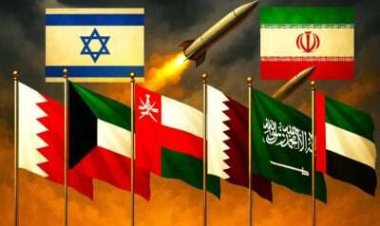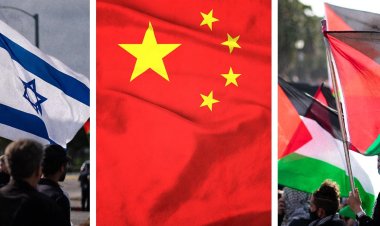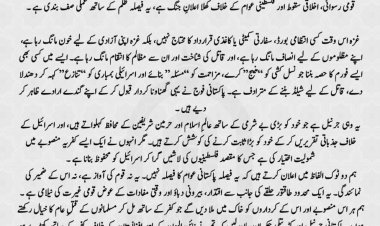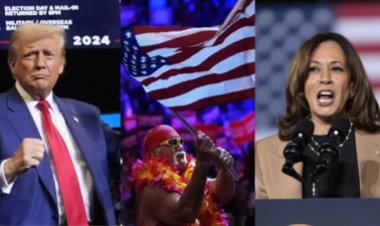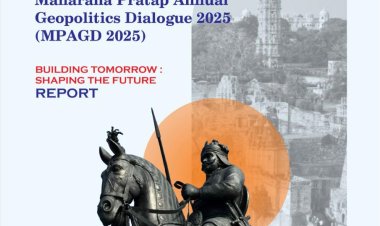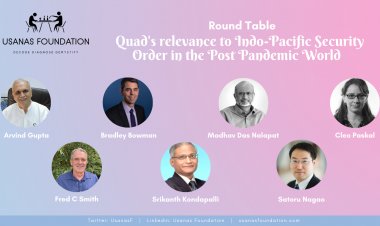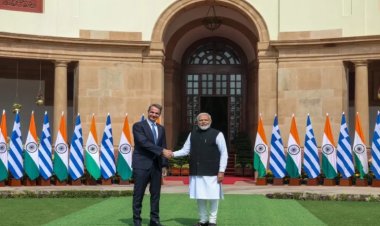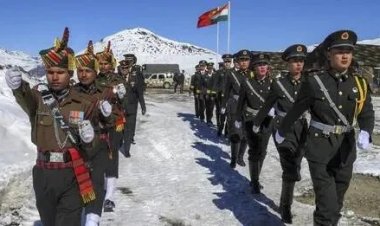Understanding the Dynamics of India-Israel Relations
The past, present and the future of India and Israel; analysing the dynamics of systemic, national and individual factors working to fulfil both nation's strategic interests.
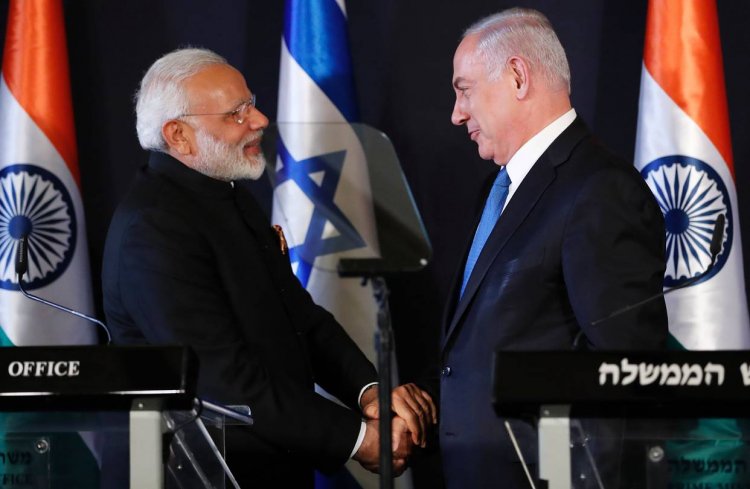
Commentary
By Dr Anoop Kumar Gupta
The India-Israel bilateral ties have evolved in several phases and have witnessed many changes over a period of time. A kaleidoscopic view of the two states' relations witnessed their bilateral relations progress from strategic hesitation and strategic ambiguity to strategic partnership and military cooperation. India's Israel policy has been determined and shaped by both ideational compulsions as well as structural factors.
India's politico-strategic perception towards Zionism and Israel has remained diverse and plural since the beginning of the twentieth century. Father of the Nation, Mohandas Karamchand Gandhi and India's first Prime Minister, Jawaharlal Nehru were against Zionism, but on the question of Israel's right to exist, they were perplexed, which reflected in India's hesitance to engage with the Jewish state. India's Left-leaning political parties have demonstrated a very critical approach towards Zionism and Israel. Indian Left Paradigm explained Zionism and Israel through the ideological lens of Marxism and Leninism. On the other hand, the Hindu nationalist Vinayak Damodar Savarkar was sympathetic to the Zionist cause and was supportive of the movement to establish a national home for the Jews. The realists in India perceive Israel as strategic and technological assets on various pragmatic considerations based on national interests, national security and national development. Non-reciprocity of Arab-Muslim world to India's national security concern compelled the realists to be vocal regarding revising India's Israel policy.
For decades India followed the Nehruvian world view of perceiving the 'Jewish nationalistic aspiration' through 'an Islamic prism' sympathetic to the Arabs and Persians in the West than the Jews and Christians. This Nehruvian policy was doubled-edged; it was also used to garner the Indian Muslims votes in electoral politics.
In the formative years of India's foreign policy, engagement with Israel was almost neglected, and the bilateral relations have been minimal. India under Indian National Congress in alliance with the Communist Party of India, did not support the Zionist effort to establish a homeland for the Jewish people. Zionist diplomacy could not convince Mahatma Gandhi to support its demand of homeland for Jews. Taking a pro-Arab stand, independent India did not support the partition plan of mandated Palestine at UN(United Nations) and voted against this plan on November 29, 1949. India also voted against Israel's admission into UN in 1949.
A shift in Indian stance towards the State of Israel began when India extended its recognition to Israel in 1950 and approved to open the Israeli consulate offices in India. It reflected a new phase of limited diplomatic relations with Israel; however, India's pro-Palestinian policy remained unchanged. Despite India's pro-Arab stand, back-channel diplomatic and military engagement between India-Israel continued. During the Indo-China war of 1962, India looked up to military cooperation with Israel, and Isreal reciprocated with a supply of military equipment. Israel also transferred essential military assistance to India during India's war with Pakistan in 1965 and 1971. However, Israeli hopes of normalisation of India-Israel ties did not fructify, as India denied establishing full-fledged diplomatic relations with Israel until the end of the 20th century. Subsequently, India's Prime Ministers after Nehru, namely, Indira Gandhi and Rajiv Gandhi, did not see much to gain in engaging with Israel.
Later, PM Narasimha Rao revised and rectified India's Israel policy to foster mutual benefit. Despite being a Congress leader, PM Rao was not obsessed with traditional pro-Arab Nehruvian legacy of the party. He was more inclined towards political realism rather than Nehruvian liberal internationalism. Structural factors such as the end of the cold war, the disintegration of the Soviet Union and the emergence of the unipolar structure at global level, decline in Arab-Israel conflict and beginning of Israeli-Palestinian peace process at the regional level and India's economic and security concern at the national level also played an important role in the reassessment of India's Israel policy. The bilateral ties underwent a sea change in January 1992, which ushered a new beginning in the evolution of India-Israel relations.
NDA I (National Democratic Alliance I) regime under PM Atal Bihari Bajpayee gave a further push to intensify India-Israel relations. Kargil war with Pakistan in 1999 acted as a catalyst in cementing India-Israel ties. Jaswant Singh became the first foreign minister of India to visit Israel in 2000. The visit resulted in the establishment of the joint anti-terror commission. Relations strengthened with the visit of the Israeli Prime Minister Ariel Sharon to India in 2003. This was the first-ever visit by an Israeli PM to India. It gave a high profile touch and visibility to bilateral relations. NDA I signalled that it was interested in 'taking the relationship out of the closet and to a different phase..'
During the decade (2004-2014) of the UPA (United Progressive Alliance) regime led by PM Manmohan Singh, bilateral cooperation in commercial, military and agriculture field continued. However, the UPA regime maintained a low profile of its engagements. No high-level political engagement took place in this period. Bilateral ties, particularly in the military sector, 'went back into the closet'.
NDA II under PM Narendra Modi has accelerated India-Israel ties to a new level of dynamism. India's Israel policy under PM Modi reflected the logical culmination of the diplomatic process that started in 1992. Within two years of its tenure, the Modi government had formulated a visible, vibrant, dynamic and energetic Israel policy. It has reported that PM Narendra Modi and PM Binyamin Netanyahu share a good rapport.
India-Israel relations under PM Modi witnessed a visible speedy movement. Modi regime has expressed its willingness to harness the full potential of India-Israel relations. Departing from the earlier policy framework of keeping a low profile in engaging Israel, Modi regime gave high visibility and a high profile touch to India-Israel diplomatic relationship. Modi regime also gave a positive impetus to the already existing mutually beneficial bilateral defence partnership.
Previously there has been a tendency in India to keep the military and defence relationship under the veil of secrecy. Now under the NDA II regime, the mindset of hesitation in talking openly about defence partnership has been shunned away. PM Modi's stand-alone visit to Israel in July 2017 proved to be a historic event as this was the first-ever visit by any Indian head of state to Israel.
Modi regime has fully de-hyphenated India's diplomatic engagement with Israel and the Palestinian Authority. PM Modi has displayed equidistance towards Israel and Palestine and denied to take sides in their conflict. Previously India's Israel policy was deeply influenced by domestic compulsions to support the Palestinian cause. Now Israel has emerged as an independent variable replacing its earlier status of the dependent variable in India's diplomatic engagement in West Asia.
The intensification and diversification of India-Israel relations are intrinsic to PM Modi's vision for India in acquiring 'state of the art' and 'cutting edge technology' to make India strong and competitive. Thus, India-Israel defence relations have moved beyond the buyer-seller framework, and today, it encompasses joint development and co-production. To further enhance the agriculture sector cooperation, both countries have agreed to increase the number of centres of excellence in agriculture.
Strategic thinking at the decision-making level rather than structural compulsions at the global and regional level has given a dynamic push to India-Israel ties. This reflects the change in India's strategic culture under PM Modi in which Israel has emerged as one of the crucial components in India's Grand Strategic calculation.
The future course of India-Israel relations depends on the dynamics of systemic, national and individual factors which aim to fulfil the respective nation's strategic interest. The convergence of national interests between India and Isreal, especially in combatting Islamic terrorism and other national security-related issues have helped them develop an ambassadorial level diplomatic cooperation since 1992. India's endeavour towards military modernisation and its need for procuring relevant military technology intersects with Israeli military-industrial complex's quest for a market in Asia.
At the structural level, India-Israel bilateral relations have a triangular dimension that could be termed as USA-Israel-India. The US factor, particularly the nature of India-US relations, has its bearings on the development of India-Israeli military and strategic ties. The positive development of India-US relations since the Civil nuclear deal in January 2015 and enhanced military cooperation through LEMOA Logistics support agreement in April 2016 widened the scope for Indo-Israel military cooperation. Whereas, the Israeli sale of the weapons to China is seen as an irritant for Washington.
However, there are apprehensions regarding bilateral relations between the two at the sub-system level and national level. The dynamics of multi-party democracy and representative politics in India directly impacts India's foreign policy initiatives. Anti-Israel radical groups and political parties, especially the left parties in India favour an Independent Palestinian state and often raise slogans against Isreal. Though these groups and parties are not decisive in determining the course of the bilateral relations, they do form hurdles in deepening the ties with Israel.
Given the multi-polar nature of West Asian geopolitics, India has adopted the strategy of multi-alignment in the region. West Asian geopolitics is polarised enough and witnesses many poles such as Israel, Saudi led group, Iranian pole and Turkish-Qatar alliance. Maintaining its strategic autonomy, India has developed very close relations not only with Israel but also with UAE, Saudi Arabia, Egypt, Jordan, Iran and the Palestinian Authority. The recent initiative of the UAE and Bahrain to establish diplomatic relations with Israel indicates increasing legitimacy of Israel in Saudi led pole, which is a positive development for India-Israel relations.
Iran and Arab states are an important source of India's growing need for energy and foreign capital. Moreover, the remittances earned by Indians working in Gulf countries is a big source of revenue. Following its multi-alignment strategy, India also avoided taking a side in the emerging geopolitical equations in the region, whether Israeli-Palestinian conflict or Iran-Saudi rivalry or Saudi-Qatar standoff. India's bourgeoning relations with Iran could have its bearings on Indo-Israeli relations, particularly in the event of deterioration in Iran-Israel relations. Israel considers Iran as a mother of terrorism while India considers Iran not only as a rich source of energy supply but also a strategic partner and vital to India's access to Afghanistan through Chabahar port. Israel's growing partnership with Pakistanis is worrisome to New Delhi. Pakistan is interested in building ties with Isreal, as it is paranoid of India's military modernisation with Israeli support. Israel's diplomatic engagement with Pakistan and reported transfer of arms by Israel to Pakistan has created apprehension in the minds of the Indian defence establishment. However, Israel has vehemently denied selling any military equipment to Pakistan.
Despite these apprehensions, India-Israel relations are moving swiftly in a positive direction and expected to remain so. Assuring mutual concerns at a regional level regarding Iran or Pakistan, India-Israel relations are progressing substantially. It is anticipated that the bilateral cooperations would increase in the post-Covid scenario. Both the nations have continued to cooperate on joint development of Covid-19 test kit, enhancing cybersecurity cooperation and deepening the military cooperation amid a standoff with China at Ladakh. Relations have been institutionalised over the past few years, and any upheaval in regional dynamics in west Asia or domestic politics in India can not end or reverse the course of direction of the India-Israel relations. All the political streams except for left parties in India now realised the importance of a strong India-Israel tie. Even if there are any deep pulls and pressures at the domestic and regional level, any change in India's current equation with Israel would only be rhetorical and idiomatic rather than a substantive one.
The author has been visiting researcher at the Hebrew University of Jerusalem, Israel and an alumnus of School of International Studies, JNU New Delhi.
Disclaimer: This article is the author’s individual scholastic contribution and does not necessarily reflect the organisation’s viewpoint.





